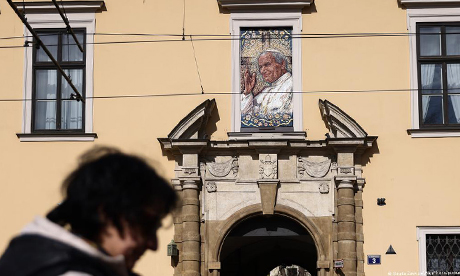Claims Pope John Paul II knew of child sex abuse cases in the Catholic Church during his tenure as Archbishop of Krakow in Poland, but did not take action, have created divisions in Poland.
The accusations on Polish TV channel TVN24 have sparked a national debate.
Some defend the late pontiff’s legacy, while others demand justice for the victims and accountability for those who may have covered up the abuse.
The period scrutinised in the documentary is the 1960s and 1970s before Karol Wojtyla was elected pope in 1978.
John Paul II is viewed as a national hero in Poland because of his opposition to communism and strong influence on Polish politics and culture.
However, the scandal is being used by some to score political points.
Some in Poland have said that the allegations should lead to a reassessment of John Paul II’s legacy.
Members of the opposition alliance, The Left, is calling for John Paul II to be ‘cancelled,’ removing his name from public spaces, including schools and kindergartens named after him.
However, Poland’s conservative political alliance, the United Right, has seized the opportunity to divert attention from its problems.
The Law and Justice party (PiS), the largest party in the alliance, is under pressure due to rising prices and several corruption scandals.
The government’s response was swift and strongly worded: Prime Minister Mateusz Morawiecki called the accusations “an attempt to trigger a culture war in Poland.”
Culture Minister Piotr Glinski went so far as to say that “an attack on the pope is an attack on Poland”.
The current archbishop of Krakow, Marek Jedraszewski, sang a similar tune, speaking of a “second assassination attempt on John Paul II” – a reference to a gunman who seriously injured John Paul II in the Vatican in May 1981.
“Wojtyla was a child of his era”
Yet the dispute about the accusations against John Paul II transcends the usual left-right political divide.
An icon of Poland’s liberal opposition, Adam Michnik, the editor-in-chief of Gazeta Wyborcza, has called on people not to reduce the pope to the clerical sex abuse scandal.
“Wojtyla was a child of his era. What is a matter of course for us today was not a matter of course 40 years ago,” said Michnik.
Pope Francis has called for understanding.
“You have to put things in the context of the era. […] At that time everything was covered up. […] It was only when the Boston scandal broke that the church began to look at the problem,” said the pope in a recent interview with the Argentine newspaper La Nacion.
The Polish Bishops’ Conference responded to the documentary by stating that further archival research was necessary to evaluate Karol Wojtyla’s decisions and actions.
Furthermore, they announced the formation of an independent team to investigate cases of sexual abuse by clerics in all dioceses and religious orders in Poland.
Sources
